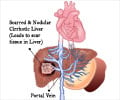A new study says that patients who are significantly underweight or very severely obese prior to liver transplantation are at increased risk of death following transplantation surgery.
A new study says that patients who are significantly underweight or very severely obese prior to liver transplantation are at increased risk of death following transplantation surgery.
The study by doctors at the University of Washington is published in the August issue of Liver Transplantation, a journal published by John Wiley and Sons on behalf of the American Association for the Study of Liver Diseases.To reach the conclusion, the research team led by Andre A. S. Dick, M.D., Department of Surgery, Division of Transplantation, University of Washington investigated the impact of pre-transplantation Body Mass Index (BMI) on post-liver transplantation patient survival.
The doctors hypothesized that individuals at the extremes of BMI were at increased risk of death following liver transplantation.
In this study, patients with BMI - 18.5 kg/m2 were in the underweight group, with 1,827 transplanted, while those with BMI = 40 kg/m2 were designated very severely obese, with 1,447 transplanted. Patients with BMI between 18.5 - 40 kg/m2 were assigned to a control group (68,172 patients) because they had similar survival rates.
When compared with the control group, the underweight patients had a higher retransplantation rate due to graft failure and were more likely to die from hemorrhagic complications or cerebrovascular accidents.
The authors of this study stated, "These patients should either be screened in the evaluation phase or be given special vigilance in the posttransplantation period to prevent strokes."
Advertisement
In patients who are underweight the authors recommend "close follow-up with a nutritionist. If the patients are unable to meet their caloric intake prior to transplantation, they should then be admitted to the hospital for aggressive nutritional supplementation such as tube feedings. This aggressive regimen is continued after transplantation."
Advertisement
RAS















